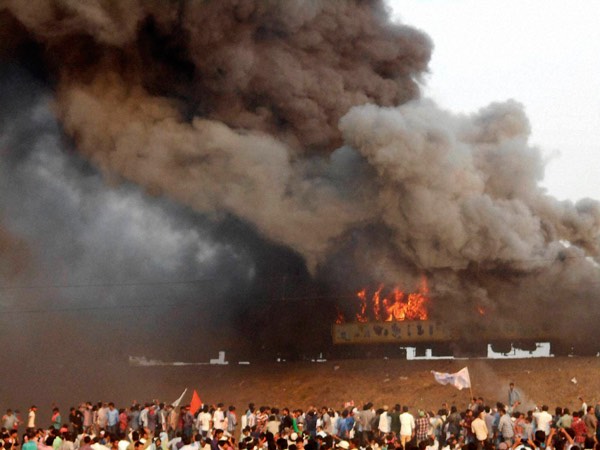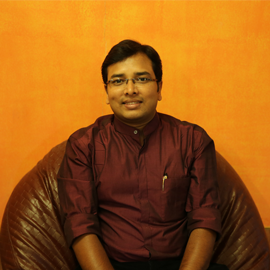Who are the Kapus and why did they torch a train?

On 31 January, four compartments of the Ratnachal Express were gutted in Andhra Pradesh's East Godavari district as a demonstration by the Kapu community turned violent. The demonstration was called by Kapu leaders to demand 'backward class' (BC) status for the community in the state.
For many, the incident revived the memory of last year's Patidar agitation in Gujarat. According to reports, around a lakh of Kapu agitators assembled at the venue, blocking roads, a national highway and rail tracks. They set afire two police stations, several vehicles and beat up policemen.

Photo: PTI
Chief Minister N Chandrababu Naidu told the media that one of the injured cops was critical. Seven passengers of the train were injured, besides media personnel and five railway officials. The protesters, on the other hand, reportedly claimed they retaliated after a police lathi-charge.
Mudragada Padmanabham, a former member of Parliament from Kakinada, had called for the demonstration. Padmanabham, currently not affiliated with any major political party, reportedly exhorted agitators to take to the streets, enforce blockades and not go home until the government accepted their demands.
Facing flak for the violence and vandalism, Padmanabham ended the road and rail blockade late night, but said he will start a hunger strike from the evening of 1 February unless the state government issues an order to include the Kapus in the state's BC list.
The incident left the state government rattled. Naidu is said to have called it a failure of the police as well as the intelligence network.
Here is a look at what the issue is all about and how things came to such a pass:
Who are the Kapus?
They are one of the three large caste groups in the Andhra Pradesh-Telangana region, the other two being the Kammas and the Reddys.
They are essentially kshatriyas, according to the traditional Hindu hierarchy, but their status fell over centuries because of marriages in lower castes, says Hyderabad-based political analyst Shashi Bhushan. Traditionally, they have been involved in agriculture.
Why are they agitating?
The Kapus seek to be included in the state's BC list so that they can get reservation in government-run higher educational institutions and government jobs. In the run-up to the Assembly polls in 2014, Naidu promised BC to them. But the promise remains unfulfilled.
Is Naidu to be blamed?
Partly. It is the duty of the state's Backward Classes Commission to recommend the inclusion and omission of castes from time to time. The previous commission's term expired in September 2011. The Naidu-government reconstituted the commission only on 18 January.
Do they really need backward status?
The jury is still out. Political commentator Mohan Guruswamy says they are essentially a backward caste but not poor. Guruswamy, who hails from the region, disagrees with the idea of Kapus being kshatriyas as the varna system doesn't exist in the southern states as it does in the north.
Economist Amir Ullah Khan, also from the region, says the Kapus are a dominant land-owning caste who have come to realise they don't have much to earn from agriculture. Khan says the Kapus' agitation is the same as the ones by the Patels of Gujarat, Jats of Haryana, Marathas of Maharashtra and the Gujjars of Rajasthan.
The fortunes of these communities have fallen with the decline in the agriculture sector's performance. Without much education, their youth don't have a bright prospect in the job market. This has led them to believe that reservation will bring them salvation, Khan believes.
The land-holding Kapus have lost ground with agriculture becoming less profitable
According to Shashi Bhushan, it's a battle for aspiration inspired by the creation of Telangana. The Velamma caste, to which Telangana Chief Minister K Chandrashekhar Rao belongs, had the same status as Kapus in undivided Andhra Pradesh - upper caste and educated.
But they couldn't stand up to the Reddys and Kammas and Telangana was created essentially for them. This has become an aspirational example for the Kapus, Bhushan says.
What is their political status?
The Kapus have a few leaders such as Padmanabham, former Union minister Pallam Raju and former state minister Vatti Vasantha Kumar (both from the Congress) and YSR Congress' Botsa Satyanarayana and Ummareddy Venkates-warlu.
Supporters of the Kapu agitation: Pallam Raju, Vatti Vasantha Kumar, Botsa Satyanarayana
But their political weight is not significant - the Congress is largely seen as a party of the Reddys, the Telugu Desham Party (TDP) that of Kammas and the TRS of Velammas. None of the state's 15 CMs have been a Kapu.
In 2008, Chiranjeevi, a megastar of the Telugu film industry and a Kapu, had launched Praja Rajyam Party that could have been associated with the community. But he did not achieve much success and merged his party with the Congress in 2011.
Is Padmanabham their Hardik Patel?
Yes and no. AT 63, Padmanabham is much older than Patel and has had a long political career. The former legislator and parliamentarian has been with the Congress, the TDP as well as the Bharatiya Janata Party.
However, the political activism of his earlier years can be equated with Patel's efforts to create a space for himself by taking up the cause of his community.
In the late 1990s, Padmanabham is said to have forced the state government to introduce a 7.5% reservation for OBCs. Even then, hunger strike was his weapon.
Gursuwamy says he will not be surprised if the Congress is involved in creating the stir since Padmanabham is essentially an old-Congressman.
Interestingly, Congress leaders such as former Union minister Raju and former state minister Vatti Vasantha Kumar announced their support to the agitation as did Satyanarayana and Venkates-warlu of YSR Congress.
More in Catch:
Unlocking Babri: Pranab Mukherjee & Digvijaya Singh are both correct
Reading the tea leaves: Will Modi rejig his Cabinet before the Budget Session?
Nitish Kumar's Bihar Vikas Mission is a bold experiment: Will it work?
President's rule imposed in Arunachal Pradesh: 10 facts you must know
Her master's voice: what BJP's rivals say about Speaker's quota review idea







![BJP's Kapil Mishra recreates Shankar Mahadevan’s ‘Breathless’ song to highlight Delhi pollution [WATCH] BJP's Kapil Mishra recreates Shankar Mahadevan’s ‘Breathless’ song to highlight Delhi pollution [WATCH]](https://images.catchnews.com/upload/2022/11/03/kapil-mishra_240884_300x172.png)

![Anupam Kher shares pictures of his toned body on 67th birthday [MUST SEE] Anupam Kher shares pictures of his toned body on 67th birthday [MUST SEE]](https://images.catchnews.com/upload/2022/03/07/Anupam_kher_231145_300x172.jpg)






_in_Assams_Dibrugarh_(Photo_257977_1600x1200.jpg)